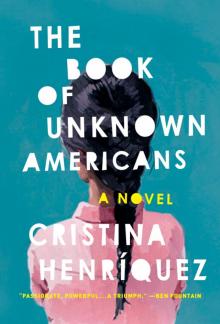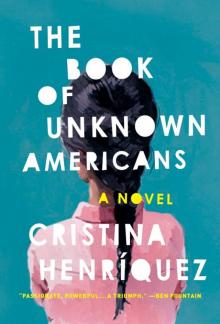- Home
- Cristina Henriquez
Come Together, Fall Apart
Come Together, Fall Apart Read online
Table of Contents
Title Page
Copyright Page
Dedication
YANINA
ASHES
DRIVE
MERCURY
BEAUTIFUL
CHASING BIRDS
THE WIDE, PALE OCEAN
THE BOX HOUSE AND THE SNOW
COME TOGETHER, FALL APART
Acknowledgements
About the Author
PRAISE FOR
Come Together, Fall Apart
“Luminous ... Each story is full of subtle surprises and unexpected twists.”
—San Francisco Chronicle
“Henríquez creates a vision of Panama that is at once sweepingly realistic and subtly hallucinogenic. Losses great and small are common currency, and yet these fluid stories abound in beauty, irony, and magic. Like Junot Diaz and Daniel Alarcón, Henriquez is an immensely gifted young writer who evokes the spirit of a struggling land and the people who love it beyond reason.”
—Booklist (starred review)
“[A] dazzling new talent. Henríquez’s voice is artfully simple and unembellished, soft yet quietly piercing.... Compassionate, tender, and fresh.”
—Kirkus Reviews (starred review)
“Henriquez shows great promise.... [She] finds the pulse of Panama without having been born there. After reading Come Together, Fall Apart, you’d swear she had lived there her entire life.”
—Fort Worth Star-Telegram
“How does a young writer gather the wisdom, heart, and tenderness to write stories of such exquisite humanity? I can only guess she is an ancient soul, a Zen master, a bruja, or all of the above. However it’s done, I bow deeply and welcome this first collection.”
—Sandra Cisneros, author of The House on Mango Street and Caramelo
“This is a very finely tuned collection of stories. What strikes me most is its bravery—both political and emotional. The stories sing, and what they sing of feels heartfelt, original, and true. A striking new voice full of empathy, detail, and imagination.”
—Colum McCann, author of Dancer and This Side of Brightness
“This is no ordinary debut. In story after lyrical story, Cristina Henriquez challenges us to revisit the familiar terrain of love, family, and separation—and discover something new about ourselves. She writes with a rare delicacy and compassion. Her tales will lodge themselves deep in your heart.”
—Cristina Garcia, author of Dreaming in Cuban and Monkey Hunting
“Cristina Henriquez writes stories of quiet violence and terrifying beauty. This is a truly exciting debut collection.”
—Daniel Alarcón, author of War by Candlelight
“There’s a restlessness to these rich and passionate stories. It’s clear that they each needed to be told, and now they need to be read. Cristina Henríquez’s voice feels as real as the world she writes about.”
—Oscar Casares, author of Brownsville: Stories
“These beautiful, affecting stories follow people into moments of profound discovery about themselves, their families, their culture.”
—Bret Anthony Johnston, author of Corpus Christi
“Henriquez’s prose is spare, vivid, and poetic. Additionally, it offers insights into life in Panama—its diverse landscapes, culture, and people. The voice in each story is tender and unyielding.”
—San Antonio Express-News
THE BERKLEY PUBLISHING GROUP
Published by the Penguin Group
Penguin Group (USA) Inc.
375 Hudson Street, New York, New York 10014, USA
Penguin Group (Canada), 90 Eglinton Avenue East, Suite 700, Toronto, Ontario M4P 2Y3, Canada (a division of Pearson Penguin Canada Inc )
Penguin Books Ltd, 80 Strand, London WC2R oRL, England
Penguin Group Ireland, 25 St Stephens Green, Dublin 2, Ireland (a division of Penguin Books Ltd)
Penguin Group (Australia), 250 Camberwell Road, Camberwell, Victoria 3124, Australia (a division of Pearson
Australia Group Pty Ltd.)
Penguin Books India Pvt. Ltd., 11 Community Centre, Panchsheel Park, New Delhi—110 017, India
Penguin Group (NZ), Cnr Airborne and Rosedale Roads, Albany, Auckland 1310, New Zealand (a division of Pearson New Zealand Ltd)
Penguin Books (South Africa) (Pty) Ltd, 14 Sturdee Avenue, Rosebank, Johannesburg 2196, South Africa
Penguin Books Ltd, Registered Offices: 80 Strand, London WC2R oRL, England
This is a work of fiction. Names, characters, places, and incidents either are the product of the author’s imagination or are used fictitiously, and any resemblance to actual persons, living or dead, business establishments, events, or locales is entirely coincidental. The publisher does not have any control over and does not assume any responsibility for author or third-party websites or their content.
Copyright © 2006 by Cristina Henriquez
Hand lettering © 2006 by Joel Holland
Acknowledgment is made to the publications in which these stories first appeared: “Drive” in The Virginia Quarterly Review; “Ashes” in The New Yorker; “Mercury” in Glimmer Train, “Beautiful” in TriQuartely.
All rights reserved
No part of this book may be reproduced, scanned, or distributed in any printed or electronic form without permission. Please do not participate in or encourage piracy of copyrighted materials in violation of the author’s rights. Purchase only authorized editions
RIVERHEAD is a registered trademark of Penguin Group (USA) Inc
The RIVERHEAD logo is a trademark of Penguia Group (USA) Inc
First Riverhead trade paperback edition: April 2007
eISBN : 978-1-101-12709-4
Henríquez, Cristina, date
Come together, fall apart a novella and stones / by Cristina Henríquez
p. cm.
eISBN : 978-1-101-12709-4
Panama—Social life and customs—Fiction 1. Young women—Fiction 1. Title
PS3608 E565C66 2006
2005050848
813’.6—dc22
http://us.penguingroup.com
FOR MY FAMILY
YANINA
Yanina has asked me to marry her forty-five times. Sometimes she makes elaborate plans before she proposes. Like last time: She gathered broken crab legs and laid them on the sand to spell MARRY ME, RENÉ, in English and everything. At least that’s what she told me. By the time she convinced me to go to the beach, the tide had come in enough to wash away half of it so all that was left was MAR RENÉ, and I was like, Yeah, I know it’s the ocean, you didn’t have to drag me all the way down here to tell me that. She started crying right there. She’s very emotional like that. She tried to explain through tears and little bubbles of saliva that she wanted to marry me. More than anything in the world, that’s what she wanted. I know, mami, I told her and held her close, her sea-salt hair rough against my face. Then why don’t you? she moaned into my chest. Soon, I said, which is what I always say. She looked at me with puffy, red eyes. I thought she was going to start crying again. But instead, she got mean. You should shave off that mustache, she said. It makes you look so stupid. I knew she was only trying to hurt me because I had hurt her. Her brand of meanness was of the temperate variety. She threw little punches but they were never the sort to leave bruises. Come on, I said, and bent down. She stuck out her lip but then climbed on, hooked her legs around my waist, her arms around my neck, and I carried her off the beach, up the dirt road to our house.
We got this house in El Rompio from Yanina’s godfather, Mauricio de Bernal. He left for the United States last year and told Yanina she could use it when she wanted. When she lost her job at a department store called Mattito�
��s a few weeks ago, we decided to split Panama City and land here for a while. I was at university, out of school for the summer break, anyway. It’s nice—far from the city. There’s one restaurant, a convenience shop, and a few older couples who rent or own the handful of houses that exist out here. We met a neighbor named Diego when we first arrived. He lives with his aunt, but we haven’t seen him—or any other neighbors—since. Who knows how long we’ll stay, but I don’t ask questions because either Yanina will go, You want to stay longer? and that will get her hopes up, or else she’ll say, You want to leave already? and that will make her mad.
The worst thing about this setup is that Yanina makes us sleep in separate rooms. She insists. On our drive out, she went on and on about respect for her godfather, who is a churchgoing man, the real deal, Jesus’ blood in his veins and everything. If we slept in the same bed before we were married, apparently, according to him, it would be a sin. Even so, the first night we were here I tried to climb into bed next to her. I thought it was worth a shot. The sheets were thin and musty and I had to step over a hoard of ants huddled on a sweet spot on the floor just to get to her. I lay down and put my arm over her waist, fitting my knees into the bend of hers, feeling our skin stick together lightly. A few minutes later Yanina shifted and said, Okay, back to your room now. There was no talking her out of it. She kept lecturing me about loyalty to her padrino, saying he wouldn’t have wanted it in his house. She loved him a lot, that man. He was like a father to her in certain ways. When she was growing up, her own father had run off with a Dominican woman and then died a few years later. What could I do? I went to another bedroom, one where the bed sagged so much along one side that I had to push it into a corner and sleep touching the concrete wall to avoid rolling off during the night. The wall was cool against my skin, but I would rather have been pressed against the shimmering warmth of Yanina.
Now I get up early in the morning, when a sweep of ocean mist still hangs in the air, and go to her room to watch her sleeping. Usually she’s completely under the covers—head and everything—and by now, I know just where to peel back the sheet to reveal her face. She has a tiny body, though it’s not without its meat. Mostly in her hips, and she has a little bit of a belly. Her breasts are small. I can cover the whole of one with my hand. She lets me do that once in a while when we’re lying side by side; she’ll take my hand and guide it up to her chest—a chest like a little bird’s—letting me cup my palm over her breast, her pale nipple. It feels so good to touch her like that.
Sometimes I don’t know why I haven’t asked her yet. What’s stopping me. It’s like there’s an invisible wall. I keep walking forward, thinking I can step right into a new future, but I run into that wall every time, without knowing that it’s there, without being able to say what it looks like. Then other times I see everything crystal clear: I’m not ready yet, I’m not sure about her, I don’t know if what we have is enough to stand up to a whole life. But I never say these things out loud.
She’s awake now and making breakfast. I go to help but she’s trying to prove something. She fries thick slices of ham and lays them on toast, then drenches the whole thing in honey.
“Good,” I tell her, chewing.
She looks pleased.
“How’s your book?” I ask. She’s reading about graphic design. She’s trying to carve out her path in this life, she’s told me. Mattito’s was just a stopover.
“I’m reading about type,” she says.
“Does it mention me?”
“What?”
“You know, how I’m your type.” I grin. I’m studying business at university. I can’t get what she’s doing. She always loved art. She used to sketch all the time in this little green notebook. She did me once. My face came out kind of lopsided and flat-looking but she said that was the style. At some point I guess she realized there was no money in art, and graphic design was booming in Panama. So she got on the computer.
Yanina puts her hands on her hips. “You don’t have to be such a clown all the time, René.”
I push the chewed bread up between my lips and teeth and smile at her, the honeyed mush peeking out like doughy gums.
She can’t help herself. She cracks up, her face ablaze with laughter until the top mash of bread falls out and plops onto the table.
“You’re cleaning that up,” she says, but she’s still smiling.
After breakfast, I go check on the dogs. They came with the house. We saw them when we first pulled up—two skinny brown hounds tied to concrete poles and barking at us. We assumed they’d been left behind, whether by accident or on purpose it was hard to tell. But we tossed food between the poles to calm them. Yanina started by throwing pieces of bread straight from the plastic sleeve. They’re not ducks, I told her. So we flung chicken on the ground and they ate it, bones and all. I named them: Perro and Perron. I check on them every day. Yanina thinks it’s good for me, like having kids. I let them loose one at a time so they can get some exercise.
“Which one’s the girl?” Yanina asks today, through the window, as I’m unleashing Perro.
I point to Perron. The leash buckle is rusted and I have to pull hard to get it to come undone.
“You should let the girl go first!” Yanina shouts. She’s doing dishes in the kitchen. I hear the water sloshing. “That would be polite.”
“I don’t think dogs are really into chivalry, you know?” I yank again on the leash and it falls off Perro’s neck. He’s probably a hundred yards away already by the time I look back over my shoulder, through the screen window, to see Yanina frowning at me.
“Come on,” I say. “They don’t know the difference.”
“What’s the girl’s name?”
“Perron.”
“Evita,” Yanina says, smiling.
I’m not sure I heard her or maybe she didn’t hear me. “Her name’s Perron,” I say again.
“Right. Eva Perón.” Yanina laughs. She thinks this is a funny joke. “That’s what I’m going to call her from now on—Eva.”
My girl’s so stupid, I think. It’s the dumbest thing I’ve ever heard. But it makes me smile, too. “Eva Perón died of cancer, you know.”
“René,” Yanina says, “you’re so sweet sometimes. You know that? You should hear me telling my mama about you. Mami, he’s such a nice boy! And he always knows just the right thing to say.” She smiles sarcastically and leans across the sink, pressing her face against the inside of the screen, making her caramel skin into tiny grids where it touches. “Don’t you want to get married, mi amor?” She presses her lips flat like flower petals. They’re some gorgeous shell-colored lips.
I could say yes. I could say it right now, I think. I could walk out of one life and into the next just like that.
“Soon,” I tell her at last. Eva Perón barks sharply.
“Eva thinks it’s a good idea,” Yanina says.
“Eva said ‘soon,’ too.”
“You speak dog now?” Yanina gazes at me for a few seconds, her dark eyelashes so long they nearly brush against the metal screen. Then she walks away, out of the frame of the window. Just leaves. Maybe she goes to her bedroom to get under the sheet and contemplate everything like she does when she’s sad. Or maybe to the car, where she escapes to cry because she doesn’t want me to hear her.
Eva nudges her head against my arm.
“What?” I ask.
She lifts her paws and lowers them again, prancing in place, and just stares at me with her glassy eyes.
Yanina and I met at Restaurante Boulevard. I went in for a strawberry milk shake and this friend of mine, Graciela, saw me and told me to come sit. That was the first time I saw Yanina. She was small behind the table, her hair coiled in a plastic clip. She didn’t make too much of an impression. Graciela and I talked about whatever; I don’t even remember now. But I recall perfectly this moment when Graciela started laughing because some of my milk shake had collected on my upper lip and was in my mustache.
“Why do you have that thing, anyway?” Graciela asked. “No one has mustaches anymore.”
Yanina giggled. “It’s to make up for the hair that’s missing from his scraggly eyebrows.”
I shot her a look. She’d hardly said anything up to that point and she didn’t even know me. Graciela practically fell on the floor laughing. Yanina didn’t look pleased with herself, though. She looked sorry. I knew then that she was complicated. That didn’t help her cause. I didn’t usually go for the complicated ones. And she’d insulted me, too. So when Graciela mentioned a party and asked if I could drive Yanina there, I said no. Graciela kicked me under the table. I guessed she was trying to set us up. I didn’t want it to be like that, though. I looked at Yanina and said, “You need a chauffeur? At your service.” Graciela kicked me again.
When I picked Yanina up, she was wearing a low-cut sparkling purple dress. Under the streetlamps, the light danced off her like a disco ball.
“I didn’t know it was that kind of party,” I said when she got in the car. I was wearing blue jeans and a T-shirt.
“Maybe I’m just that kind of girl,” she said.
“What kind?” I pulled the car away from the curb.
“The—” she started. She looked out the window. “The kind who wants to look nice for a party?”
“Okay,” I said.
We were quiet after that. She kept making little noises like she wanted to say something, but then she wouldn’t. I didn’t have much interest in starting a conversation anyway.

 The Book of Unknown Americans
The Book of Unknown Americans Come Together, Fall Apart
Come Together, Fall Apart The Book of Unknown Americans: A novel
The Book of Unknown Americans: A novel The World in Half
The World in Half